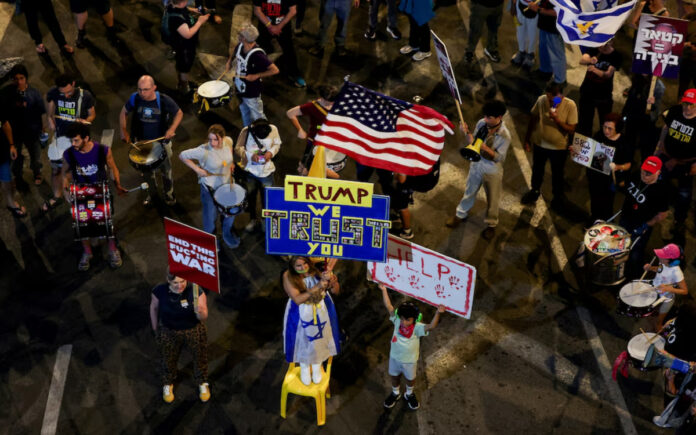Jerusalem: Israel’s right-wing government has maintained a conspicuous silence in response to a wave of diplomatic moves by U.S. President Donald Trump that have unsettled long-held assumptions about Washington’s support for the Jewish state.
Trump’s decision to exclude Israel from his ongoing Middle East tour has been widely interpreted as a signal of shifting U.S. priorities. The administration has focused instead on high-stakes business engagements with wealthy Gulf states, including Qatar—long accused by Israeli officials of supporting Hamas.
Even before the trip began, concerns in Israel were mounting. Trump’s engagement with Iran, a bitter Israeli adversary, along with his decision to halt airstrikes against the Houthis in Yemen—despite the group’s ongoing missile attacks targeting Israel—had already triggered unease in Jerusalem.
Tensions escalated further when the U.S. successfully negotiated with Hamas to secure the release of Edan Alexander, the last surviving American hostage in Gaza. The deal was reached without Israeli involvement, further sidelining a country that has historically enjoyed preferential treatment from Washington.
Following that, Trump announced an end to sanctions on Syria and called for normalization of relations with its new government—moves that Israel views as empowering a hostile regime with links to extremist factions.
During Trump’s remarks in Riyadh on Tuesday, where he took credit for a ceasefire deal with the Houthis, missile sirens were simultaneously sounding across Israel, including in Jerusalem and Tel Aviv, as a projectile from Yemen approached Israeli territory.
Trump dismissed any suggestion of diplomatic distance between Washington and Jerusalem, telling reporters: “This is good for Israel, having a relationship like I have with these countries; Middle Eastern countries, essentially all of them.”
Israeli Prime Minister Benjamin Netanyahu has not commented publicly on Trump’s broader regional realignment. His only statement was to express gratitude for Trump’s role in securing Alexander’s release. However, Israeli media and public sentiment reflect a growing perception that the country has been left out of rapidly evolving diplomatic developments.
Yoav Limor, a columnist for the conservative Israel Hayom newspaper, noted: “The Middle East is in the process of being reshaped in front of our very eyes through a series of agreements and meetings, while Israel has remained (in the best-case scenario) an observer on the sidelines.”
Diverging Priorities
Netanyahu—who faces a corruption trial he strongly denies—has openly favored Trump over President Joe Biden, who previously slowed weapons shipments to Israel and sanctioned several violent Israeli settlers. However, his domestic position is increasingly strained. He is caught between the far-right factions in his coalition, who demand continued warfare in Gaza, and an increasingly weary public after more than 18 months of conflict.
According to Jonathan Panikoff, a former deputy U.S. national intelligence officer for the Middle East now with the Atlantic Council, Israel is witnessing a shift in U.S. strategic priorities.
“Trump is clearly determined to move ahead with a transactional, trade and investment-focused agenda,” Panikoff said. “If the traditional political or security matters that the U.S. and Israel have always historically coordinated on closely don’t align well with Trump’s priorities, he’s going to go forward with them anyway.”
Also Read | Toddler Reunited with Mother in Caracas as Maduro Acknowledges Trump’s Role
Though the Trump administration maintains that ties with Israel remain strong, internal frustrations have surfaced. Officials are reportedly irked by Netanyahu’s unwillingness to accept a ceasefire with Hamas, despite Washington’s push to wind down both the Gaza and Ukraine conflicts.
White House National Security Council spokesman James Hewitt reiterated support for Israel and the release of the remaining 58 hostages held in Gaza: “Israel has had no better friend in its history than President Trump,” he said.
Still, hardliners within the Israeli cabinet—who once celebrated Trump’s controversial plan to transform Gaza into a resort after displacing Palestinians—have remained largely silent as U.S. policy evolves. Meanwhile, the Israeli foreign ministry responded diplomatically when asked about its exclusion from key negotiations.
Also Read | Google Warns: Hackers Behind UK Retail Attacks Now Targeting U.S. Stores
“The United States is a sovereign country,” a spokesperson said. Israel’s “intimate dialogue” with the U.S. would continue “directly and not through the media.”
While an Israeli delegation has traveled to Doha to participate in U.S.-led ceasefire talks, Israeli forces have intensified their operations in Gaza, with dozens of Palestinians killed on Wednesday.
Netanyahu reaffirmed Israel’s commitment to its war goals, including the dismantling of Hamas as a military and governing authority.
“Israel will not stop and will not surrender,” he declared.



